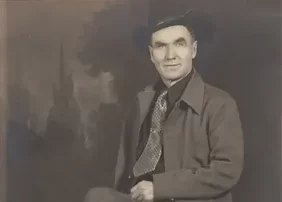George Donald “Powder River” Thompson was born in January 1895 in rural West Virginia to Frank H. Thompson and Annie J. Armstrong. After his mother died in 1901, his father remarried and by 1906 had moved the family west to Ekalaka, Montana.
Much is unknown about Powder River’s early childhood and teen years, but it is clear that he loved and embraced the West as his new home. He quickly forgot his West Virginia roots, and would claim Montana as his birthplace for the rest of his life. The West clearly had an impact on him, and he embraced the cowboy and rodeo culture that was to become the defining feature of his life. According to family stories, he began working as a ranch hand at the age of 12 or 13 and was independent from his family, which by this time included five half-siblings.
By 1917, at the time of the World War I draft, Powder River was working as a hired hand for the Simon Pepin Estate near Havre, Montana just south of the Canadian border. In July of 1917, per a local newspaper article, he “rode Ray to the finish” and placed third in bucking horses at the Medicine Hat Exhibition & Stampede in Canada. He was drafted later that year and fought in WWI as part of the American Expeditionary Forces from July 1918 through April 1919.
It was upon his return from WWI that Powder River began working as a ranch hand in Wyoming, the state that he would grow to love and call his home. He worked for the Kitchen Land & Cattle Company in Niobrara County, north of Lance Creek, which was owned by Nebraska rancher Felix Nern and a team of investors. Despite being exposed to mustard gas in the trenches of WWI and suffering from the after-effects of that experience for the rest of his life, he continued to compete in rodeos.
Although the exact year is uncertain, Powder River won the Amateur Saddle Bronc Competition at Cheyenne Frontier Days, winning a pair of spurs with silver rowels that remain in Niobrara County with the Kruse Family to this day. He also rode in the Calgary Stampede in the summer of 1919, and Cheyenne Frontier Days in 1922, becoming well known in the rodeo community as a cowboy from Lance Creek, Wyoming.
In the early 1920’s, Powder River began riding with Tex Austin’s Rodeo, which would take him all around the world representing Wyoming, including the Imperial Rodeo Exhibition that rode before King George V and Queen Mary of the United Kingdom in 1924 as part of the British Empire Exhibition. An article about the Exhibition notes that the “Calgary-style” rodeo was held in Empire Stadium, later re-christened Wembley Stadium, and was the largest sporting facility in the world at that time with a capacity of 120,000. Powder River competed and became friends with notable rodeo personalities of this time period, including Hugh and Mabel Strickland, and cowboy-turned-Hollywood-stuntman Yakima Canutt.
In 1929, Powder River married Faye (Nern) Wolfe, daughter of Felix Nern, and they made their home on the Kitchen Ranch. They had one daughter, Shirlee (Thompson) Crofutt who currently resides in Thermopolis with her husband Glenn.
Powder River continued to work as a cowboy and compete in rodeos well into his 40’s, riding in the Wyoming State Fair in Douglas in 1938 at the age of 43. He eventually relocated to the dry desert climate of Arizona to treat health issues stemming from his service in WWI, but continued his cowboy ways, leading mule pack trips down into the Grand Canyon.
Powder River Thompson passed away in September 1963 and is buried in Prescott, Arizona.


